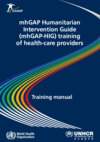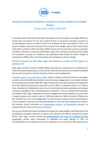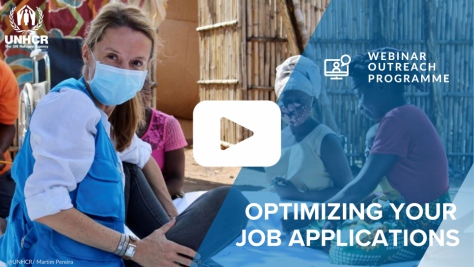UNHCR provides shelter to Iraqis uprooted by conflict in Anbar
Markazi camp is three kilometres from Bzeibiz bridge over the Euphrates river, the main access point from Anbar to Baghdad province.

Children displaced from Central Iraq in Markasi camp, Ameriyat Al Fallujah, Anbar province. © UNHCR/N. Micevic
BAGHDAD, Iraq, Oct 20 (UNHCR) - The UN refugee agency has opened a new camp for internally displaced persons (IDPs) in Ameriyat al-Fallujah, in Iraq's Anbar province.
The new Markazi camp is located some three kilometres from the Bzeibiz bridge over the Euphrates river, the main access point from Anbar to Baghdad province, and can provide shelter for some 3,000 displaced Iraqis.
The majority of the camp's residents have fled fighting in Ramadi since April this year, and have been living in schools, unfinished buildings or staying with relatives around Ameriyat al-Fallujah, which serves as a safe haven for uprooted Iraqis in the restive Anbar province.
More than 250,000 civilians are estimated to have fled Ramadi since April, with the majority staying inside Anbar province itself living with host families, in informal settlements, unfinished buildings, schools or renting apartments.
"Marzaki camp is strategically located close to the bridge connecting Anbar and Baghdad provinces so that residents can have access to safety in case conflict lines move closer to the camp," said UNHCR Iraq Representative Mr Bruno Geddo.
"Displaced people scattered throughout the area in poor living conditions will now be able to properly settle down and benefit from medical and other services close by in Baghdad," he added.
Many of those fleeing Anbar continue to be denied access into Baghdad province due to security-driven restrictions imposed by authorities, requiring Anbar residents to have relatives or some other kind of 'sponsor' in Baghdad.
In recent months, thousands of Iraqis have been stranded for days on the Anbar side of the bridge, often staying in dire conditions without enough food or proper shelter. While the situation at the bridge has improved, an estimated 50 displaced families remain at the Anbar side, unable to cross the river into Baghdad.

Displaced families from Central Iraq receive basic domestic items in Markasi camp, Ameriyat Al Fallujah, Anbar province. © UNHCR/N. Micevic
Among Markazi camp's new residents is Rawa, 23, and her husband and three children.
"We fled Ramadi four months ago. For a while, we sheltered under the trees and we had to change buses six or seven times to reach Alrahalyia," she said.
Alrahalyia is on the way between Ramadi and Ameriyat al-Fallujah.
Lacking a sponsor, Rawa's family has not been granted access to Baghdad though her husband Mohammed who suffers from serious eye problems, is allowed to cross the bridge to seek medical treatment in the city.
Markazi is next to two existing UNHCR camps, already accommodating another 3,000 displaced, bringing camp hosting capacity inside Anbar to 6,000. The newest camp can be expanded to host another 3,000 people, if required. Last month, UNHCR also opened the Sadr Al-Yusufiya camp, sheltering close to 2,000 people on the other side of the bridge, in Baghdad province.
The Markazi camp features 50 communal kitchens, 25 shaded areas, and 50 washing facilities as well an internal electricity network, along with daily water trucking. Some 300 people (or 50 families) moved into the camp on Monday (October 20), with more expected in the coming days.
The new arrivals have received mattresses, a stove, kitchen utensils, a water tank, an air cooler and other household items to help them settle in.
There are currently some 3.2 million internally displaced Iraqis spread across 3,000 different locations across the country. Anbar province hosts the largest number of IDPs - some 580,000 or 18 per cent of the total IDP population.
UNHCR has been able to build Markazi camp thanks to flexible funding from donors. Countries including the US, Sweden, the Netherlands, Norway, Denmark, Australia, France, Spain, Switzerland, and Canada have been providing UNHCR with unrestricted funding to address the urgent needs of internally displaced Iraqis and allow a timely humanitarian response.
Related news and stories
100,000 new Somali refugees arrive in Ethiopia in the past month, UN and partners are calling for urgent funding
Twelve years on, Syrian refugees face deepening debt and hunger
UNHCR teams and partners rush assistance to some 100,000 newly arrived Somali refugees in hard-to-reach area of Ethiopia
House repairs restore hope for Ukrainian family after year of turmoil
As security worsens in DR Congo, UNHCR and partners seek US$605 million to assist Congolese refugees across Africa
Tens of thousands arrive in Ethiopia, fleeing recent clashes in Somalia
-

Statement on risks of trafficking and exploitation facing refugees from Ukraine attributed to UNHCR's Assistant High Commissioner for Protection
12 Apr 2022 The following statement is attributed to Gillian Triggs, UNHCR's Assistant High Commissioner for Protection -

MHPSS Annex of Public Health Strategy 2021-2025
11 Apr 2022 The Public Health Strategy 2021-2025 reaffirms the importance of public health in preparation for, and in response to, refugee emergencies addressing the main causes of morbidity and mortality. -

mhGAP HIG Training Materials
11 Apr 2022 The mental health Gap Action Programme (mhGAP) is a WHO programme that seeks to address the lack of care for people suffering from mental, neurological and substance use (MNS) conditions. The mhGAP-IG is a clinical guide for general health-care providers who work in non-specialized health-care settings, particularly in low- and middle-income countries. The mhGAP-HIG was developed in order to address specific challenges in humanitarian emergency settings. -

Résumé - Réunion d'information informelle et virtuelle sur le Pacte mondial sur les réfugiés
11 Apr 2022 -

UNHCR Country Strategy Evaluation: Zambia
11 Apr 2022 Zambia hosts the longest-standing refugee settlement in Africa, at Mayukwayukwa. It was established in 1966 and UNHCR has been actively engaged in the country since that time. As part of its 2020 workplan, UNHCR's Evaluation Service commissioned an independent evaluation team to conduct a Zambia country strategy evaluation for the period 2015 to 2020. The purpose of this forward-looking evaluation is to generate evidence to inform UNHCR's future operational planning and strategy in Zambia. The evaluation also aims to provide inputs into UNHCR Zambia's multi-year planning strategy beyond 2022. Attachments: Management Response and Annexes (.zip) -

UNHCR's Assistant High Commissioner lauds solidarity of Romania and the Republic of Moldova towards Ukrainian refugees
9 Apr 2022 -

Ukraine: How does cash assistance empower refugees?
8 Apr 2022 -

Optimizing Job Applications web
8 Apr 2022 -

Summary record - EC/73/SC/SR.1
8 Apr 2022
